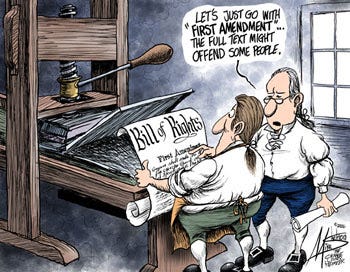University professors blame the First Amendment for continued global unrest.

University of Chicago law professor Eric Posner took a more scholarly tone but came to a similar conclusion in a widely-read article for Slate, in which he says that other nations “might have a point” when they decide that free speech must “yield to other values and the need for order.” Professor Posner challenges what he calls “the bizarre principle that U.S. foreign policy interests cannot justify any restrictions on speech whatsoever,” apparently in the belief that it is reasonable to punish private Americans for their expression if the government believes that it might adversely affect U.S. foreign relations.
Former Washington Post reporter and University of Baltimore law professor Garrett Epps piled on in The Atlantic, insisting that he would not support “hate speech” prohibitions but assuring readers that “Much of the advanced, democratic world questions” the American view of free speech, “not from ignorance but from painful experience.” Professor Epps cites a (now overturned) 1951 Supreme Court case upholding the conviction of Americans for conspiracy to teach Communism to claim that most Americans’ current inclination towards largely unfettered free speech is a historical anomaly. Not only is this not true, but it’s shocking to see a court case from the days of the Red Scare wheeled out to support censorship in 2012.
These professors have a right to make these arguments, and FIRE would defend their right to make them if they faced adverse action for their opinions. But it’s no coincidence that these attempts to justify censorship, unconvincing and specious as they may be, are coming from American academia. Colleges and universities have spent a generation subjecting students and professors to speech codes, telling them that “hate speech is not free speech” (a fallacy that FIRE hears over and over from students who don’t like that we defend the unpopular speech of their fellow students), and taking actions ranging from petty to draconian against students who dare to dissent.
National controversies like this over free speech always spill into college campuses and create trouble for freedom of expression. After Jared Loughner shot 20 people in Tucson, Arizona, last year, a lack of civility was widely blamed for the shooting before it was realized that Loughner was severely mentally ill. Mandatory civility codes that would have done nothing to stop such an attack nevertheless sprouted up like wildfire on campus. In the wake of the suicide of Rutgers student Tyler Clementi in 2010—spurred by the already-illegal action of broadcasting another person’s private sexual experience over the Internet—“bullying” codes have been adopted on campuses across the country that make no effort to distinguish between illegal harassment and speech that someone simply does not want to hear. Following this controversy, as night follows day, we can expect to see a renewed push against “hate speech” on campus, which will be defined as expression that makes another person angry or offended.
http://thefire.org/article/14956.html


